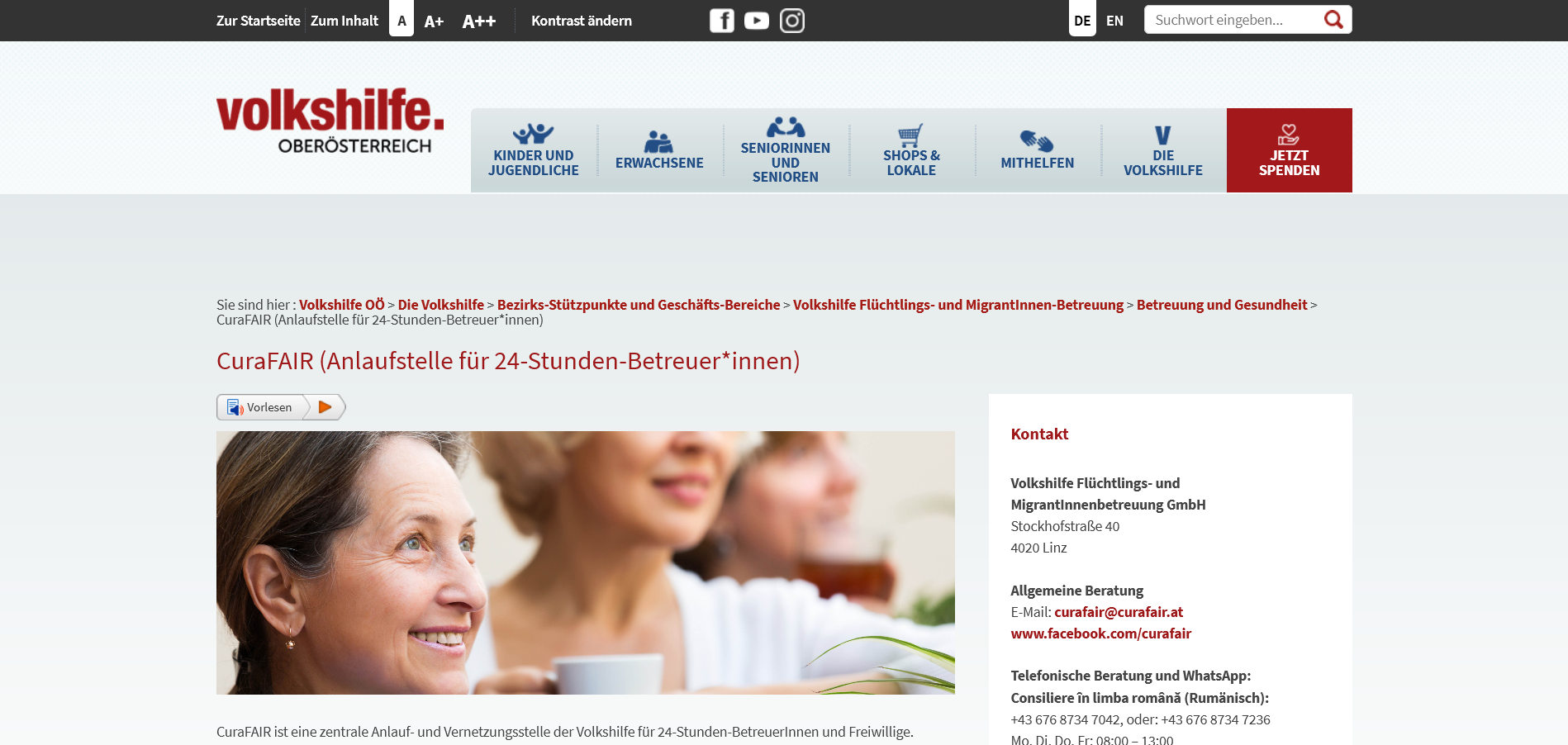IG24: Curafair has been providing counselling for 24-hour caregivers since summer 2019 and is thus the only independent and free contact point in Austria.
Can you say something about the concept and the experiences in counselling work?
As Volkshilfe Flüchtlings- und MigrantInnenbetreuung (in Upper Austria), we have been active in counselling and supporting migrants for 30 years. Since 2018 at the latest, we have noticed that personal care workers are also contacting us more and more frequently. The spectrum ranged from very easy-to-answer questions about German courses, but went all the way to very complex detailed questions, for example about social security or the rights and obligations as a self-employed person. We therefore thought we had to make a separate project specifically for personal care workers because the demand was and is so great. Especially in the course of the Corona crisis it became obvious how many problems there are in the so-called 24-hour care. Within the framework of the care reform of the Ministry of Health, our contact point was established.
We offer social and socio-legal counselling for caregivers, but also organise caregiver cafés or support other volunteers in setting up these cafés. In addition, we also want to draw attention to the many problems that exist in 24-hour care and to the excellent work of personal care workers, and we are also in contact with interest groups and politicians.
IG24: What are the issues you are confronted with on the part of caregivers?
The range of issues is very wide. Mostly it is about those questions that have to do with the formal independence of the carers. Caregivers often do not know that they are self-employed and that this also entails obligations. This is why they often have questions about social security or the tax office. We know all too well that the bureaucracy can sometimes be very difficult for Austrians, too; for foreign caregivers, who often do not speak the language perfectly, it is sometimes impossible to fill out forms without support.
We also often mediate when there are problems between the carers and agencies or relatives of the person being cared for. Unfortunately, some agencies do not take the legal basics very seriously, for example, they keep “one-time special payments” that are not regulated in the contract. We then ask how these payments came about and what the basis for them is.
However, there are also some really difficult cases, such as sexual assaults on the caregivers. There, too, we support the carers and try to help them to get their rights.
IG24: The carers come from Romania, Slovakia, Bulgaria, BSK, Hungary and Croatia.
How do you solve the problem of first language counselling?
We currently have three counsellors who together speak Romanian, Slovakian, Czech, Hungarian, German and English as their mother tongue. This covers more than 85% of the personal care workers in Austria. As Volkshilfe, we are fortunate to have staff in other projects who are native speakers of Bulgarian, BSK and many other languages. In such cases we get help from other departments.
IG24: You have been commissioned by the Ministry of Health to set up more drop-in centres in Graz and Vienna.
Can you say something about the status of the new drop-in centres?
The drop-in centres in Vienna and Graz have already been opened. This has the advantage that we can also network better with other institutions and actors in the region. The counsellors have to be with their clients for a large part of the day and rarely have a break. That’s why most of the counselling takes place by phone or digitally. When Corona allows it again, it is also planned to start setting up local caregiver cafés in Vienna and Graz. Of course, it is an advantage to be directly on site.
IG24: Are such posts also planned in western Austria?
Unfortunately, there are no plans for such places yet. But we are working on being able to offer our services regionally in Western Austria as well. But for that we still need additional sponsors.
IG24: In your opinion, are you sufficiently financed?
Basically, we can work well with the existing budget. However, we have noticed that additional financial means would be necessary to guarantee even better counselling. It would also be useful and necessary to have a contact point per province that could organise the counsellors’ cafés and the counselling sessions independently.
IG24: Finally, the “crucial question” in this sector: What is your opinion on the status of self-employment of care workers? In the ÖGB (Austrian Trade Union Federation) voices have recently been raised calling for an end to (bogus) self-employment and for caregivers to be employed by non-profit organisations!
This is of course a very important question. In purely formal terms, many defining characteristics of self-employment are not given in the work of personal care workers: Free choice of time, free choice of workplace, no direct superiors, freedom to issue instructions, etc. Many voices, also from the legal and social sciences, believe that the work of personal care workers does not have much to do with self-employment for these reasons.
We can certainly understand these arguments. In general, the Corona crisis has also shown that the entire arrangement of so-called 24-hour care in Austria is very fragile. Of course, we therefore also have to think about the future of care for the elderly in Austria and about alternatives to the self-employed model of so-called 24-hour care. In any case, our first priority is good working conditions for personal care workers, which consequently also results in an improvement of care services. We will continue to work for this!
IG24: We wish you much success in setting up the new contact points and are already looking forward to further cooperation!
Thank you very much for the interview!
www.curafair.at
www.facebook.com/curafair

